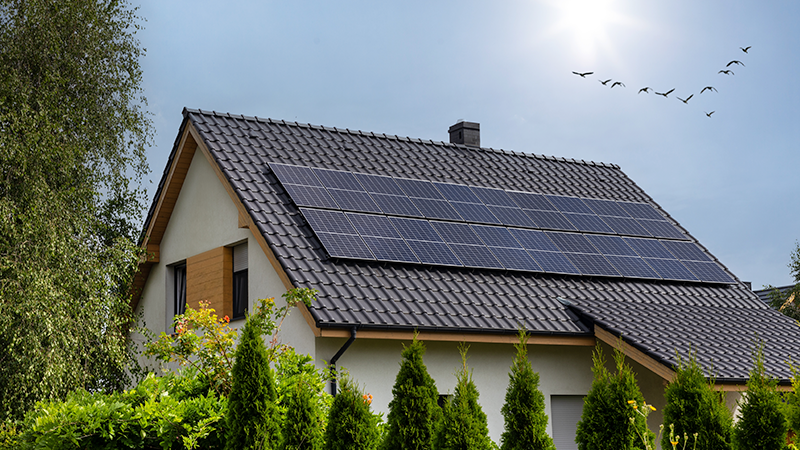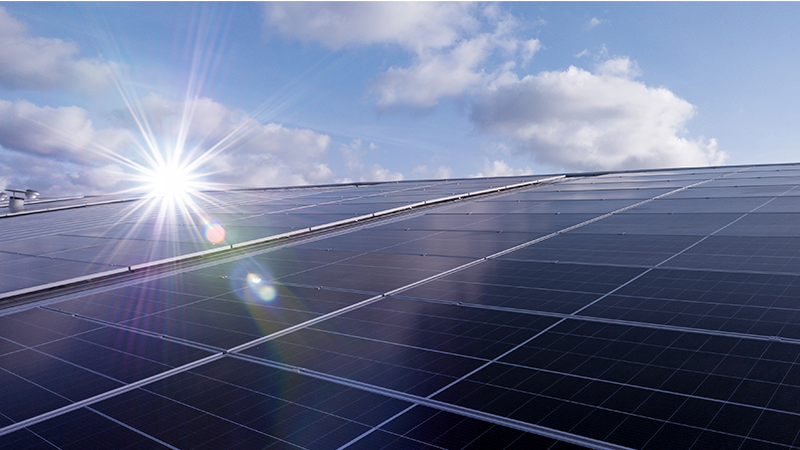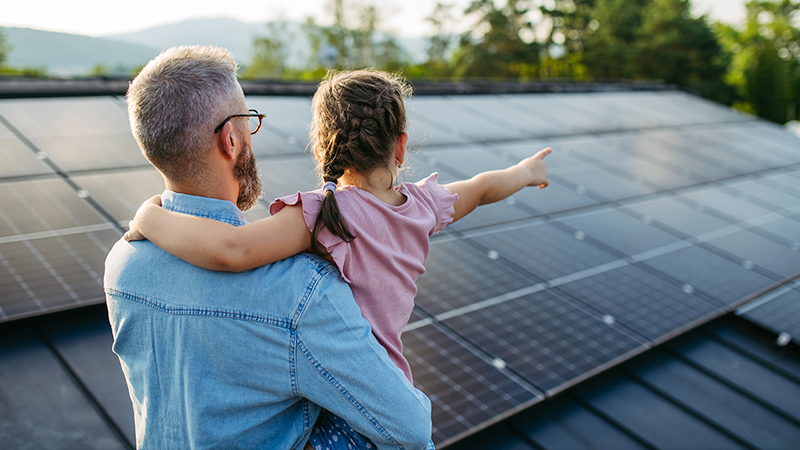Solar empowers you to be self-sufficient and energy-independent.
Solar is the top choice for those living off the grid, on self-made homesteads, or a nomadic lifestyle. Most of them choose the DIY route for various reasons we’ll explore. But what should you choose? Should you do it yourself or call on experts for a professional installation?
We are professional installers, so you can guess what we will recommend.
Nonetheless, we love seeing the creative systems self-reliant people create. We’ll highlight a few examples later. However, the reason we recommend professional installations is the warranties. There are several solar warranties: equipment warranties, craftsman warranties, and performance warranties. The last one is the key.
Our performance warranty ensures that your investment will still perform at 80% of its original efficiency after 25 years! Solar systems can last decades (with the proper care and maintenance) so secure your longevity.
When you install solar yourself, you risk voiding the warranties. All repairs, replacements, and maintenance are on you and coming out of your pocket. For some, that’s not a deal breaker, but for most of us, that adds a lot of stress and responsibility to an easy, straightforward investment.

DIY example: doing it at your own pace.
Nate Petroski is an off-grid homesteader in the beautiful hills of West Virginia. He purchased an empty 102-acre lot, set up a camper, and slowly built a self-sufficient homestead over the course of three years. He and his dog, Minion, gradually built farms, gardens, a rainwater collection system, and a solar power system.
Over the years, he’s had to upgrade, add more battery storage, and adjust his solar power system to get the most out of it. For people like Nate, it’s the journey, not the destination. Working on his solar system is part of the fun of living on your own.
But most homeowners, even those thriving in deep rural areas, want to set and forget it. Working with professionals allows you to design a solar system that will serve you in the long term. Even if your equipment needs upgrades 10— 15 years later, your installation team can make it easy.
Pros and Cons of DIY systems.
Pros
Cost savings. Many people believe that the primary benefit of DIY solar installation is cost savings. You’re doing it yourself, so you avoid professional installers’ labor costs. These labor costs can account for around 10% of the total installation cost. So, how much money are you actually saving? As you’ll see, DIY installation could potentially cost you more in the long run.
Control and Customization. Since you’re doing it yourself, you’ll have complete control over your solar power system’s design, setup, and wiring. This is good if you have specific requirements, such as installing a solar power system in a tiny mobile home. However, this workload can become a con. Additionally, solar installers design a solar system based on your home and needs.

Familiarity with your system. Installing the system yourself makes you more familiar with its components and operation. This can make future maintenance and troubleshooting easier. However, we provide every residential solar owner with a smart home monitoring system for that purpose.
Portability. DIY solar setups can be configured as portable power stations, making them suitable for those living that nomadic lifestyle.
Cons
No warranties. As mention above, DIY installations may void the warranties, leading to higher repair and replacement costs in the long run.
Ineligibility for incentives. DIY installation may not qualify for certain solar incentive programs. By working with solar installers, we can ensure you get the most out of these programs.
Safety risks. Significant safety risks include fall hazards and electrical danger to damaging your home.
Permitting and regulations. Navigating local building codes, permits, and utility company regulations can be complex, time-consuming, and headache-inducing. We handle all of that before installation.
Technical challenges that risk improper installation. While the wiring is straightforward, and you can get all the necessary tools at your local hardware store, solar still requires specific technical knowledge. Yes, there are countless YouTube Tutorials and digital resources. However, you risk an improper installation, which can lead to inefficiencies, increased maintenance, and even damage to your home.

Pros and cons of a professional installation.
Pros
Saves you time and headaches. We handle all aspects of the solar installation from designing to maintenance. We follow the best practices for optimal system performance.
Warranties. Enjoy peace of mind knowing that your investment is protected.
Experts that handle the permitting and local regulations. We obtain all the permits and work within local regulations, saving you a lot of time.
Access to incentives. Professionally installed systems are eligible for various solar incentive programs, such as net metering, federal tax credits, and Virginia’s Solar Renewable Energy Credits (SRECs). We’ll help you get the most out of these programs.
Safety. We’re trained professionals; we’ll protect your home and your investment.
Cons
Higher initial costs. Yes, professional solar installations have a higher upfront cost than DIY installations. However, as we’ve outlined above, a higher initial cost can save you time, money, and effort in the long run. Whether through government incentives or long-term maintenance, we know the peace of mind outweighs the expense.
Cannot install systems on portable structures. Most professional solar, us included, focus on stationary structures like homes and businesses. However, the nomad movement with their custom-constructed tiny homes and renovated vehicles has taken off. They’ll have to do it themselves if they want solar panels and a battery backup. However, that doesn’t mean they are on their own.

DIY example: achieving energy independence with some help.
Devin and Breanna O’Dell (along with their cat and dog) renovated a 300-square-foot school bus into a mobile tiny home. Their aptly named “Skoolie” bus has traveled from the peaks of Acadia National Park in Maine to the beaches of Baja, Mexico. The 2000W solar system and battery backup power their plumbing, A/C, heating, kitchen, and gaming setup—all the creature comforts.
However, they didn’t achieve their energized ambitions alone. When upgrading their panels, Devin and Breanna enjoyed the help of a professional solar installer. That’s a great reminder. Even if you’re the most rugged individualist, we all benefit from extra hands. There is absolutely no shame in achieving your sufficient, independent, off-grid dreams with the help of professionals.
Conclusion: whether you’re living off-grid or in the city, we can help you go green!
We showcased two DIY success stories, but let’s not forget the countless customer success stories we’ve achieved. Listen to Juli Mosnes’s testimonial or hear what Charles Griffin loves about his new solar system.
